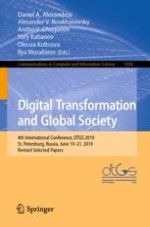2019 | OriginalPaper | Chapter
Interaction of Authorities and Citizens: What Opportunities Does the Internet Provide (on the Example of the Yaroslavl Region)
Authors : Alexander Sokolov, Yuri Golovin
Published in: Digital Transformation and Global Society
Publisher: Springer International Publishing
Activate our intelligent search to find suitable subject content or patents.
Select sections of text to find matching patents with Artificial Intelligence. powered by
Select sections of text to find additional relevant content using AI-assisted search. powered by
